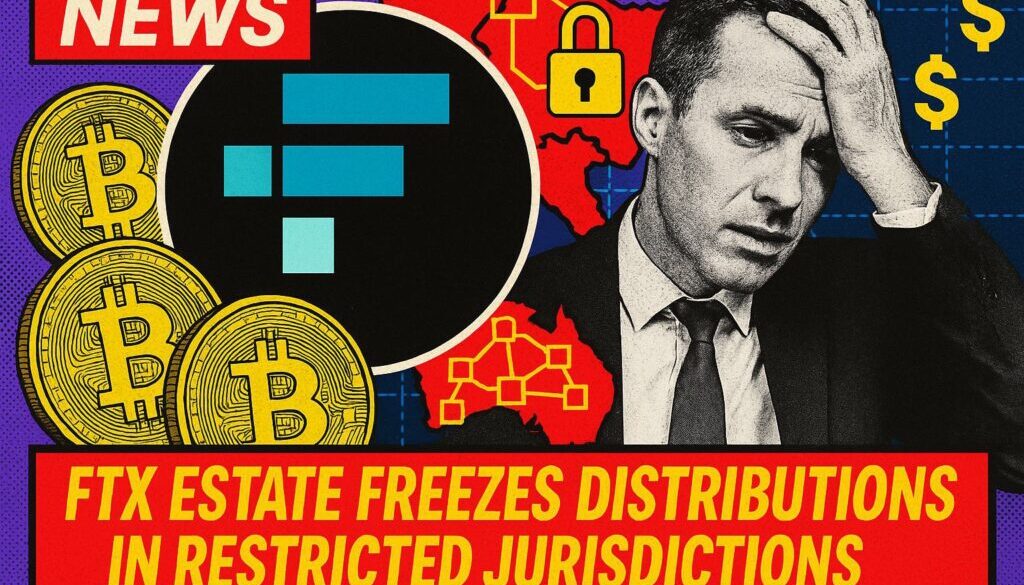FTX Estate Freezes Distributions in Restricted Jurisdictions

FTX Estate Freezes Distributions in Restricted Jurisdictions
The aftermath of the FTX collapse continues to unfold, presenting complex challenges for the bankruptcy estate. One of the latest developments has seen the FTX estate raise a significant alarm regarding creditor payouts, specifically targeting countries with ambiguous or strict cryptocurrency regulations. This move highlights the intricate legal landscape surrounding digital assets and international financial recovery.
Reasons for the Distribution Freeze
The FTX bankruptcy estate has initiated a distribution freeze primarily due to concerns about making payouts to creditors in 49 countries where cryptocurrency regulations are either unclear or overtly restrictive. These ambiguous legal frameworks pose a significant risk of legal complications for the estate and all parties involved in the recovery process.
To address these concerns, the FTX Recovery Trust filed a motion with the U.S. Bankruptcy Court in Delaware. The core objective of this motion is to gain authorization to halt distributions to creditors located in these potentially restricted jurisdictions. The estate’s reasoning is clear: distributing funds in violation of local laws could lead to severe repercussions, including:
- Significant fines
- Penalties
- Even criminal charges for those involved in the distribution process
This proposed rule would freeze over $500 million in distributions until local legal opinions can confirm that such transfers would not violate domestic laws. The estate is not entirely blocking payouts to these countries but is pausing them to ensure full compliance with the diverse and often conflicting international legal requirements.
Impacted Jurisdictions and Legal Uncertainties
The distribution freeze impacts 49 jurisdictions, underscoring the global challenges of navigating varied crypto laws within bankruptcy proceedings. This decision brings to the forefront the complexities of cross-border digital asset recovery. A particularly striking aspect of this freeze is the significant portion of affected claims linked to China.
Despite China’s stringent stance against cryptocurrency transactions, an astonishing 82% of the affected claims, amounting to over $500 million, originate from this region. This highlights a critical dilemma for the FTX estate: how to reconcile creditor entitlements with the strict anti-crypto laws prevalent in a major economic power.
The legal uncertainties surrounding crypto distributions in these regions present substantial hurdles for the FTX Recovery Trust. The estate is actively seeking guidance from the court on developing a new claims process that can adequately navigate these complexities. The cautious approach adopted by the estate is a strategic measure to prevent potential penalties and legal repercussions that could arise from non-compliance with local regulations.
Stakeholder Procedures and Community Reactions
To clarify the distribution process for stakeholders, the FTX estate has established a meticulous procedure. This involves conducting specific legal reviews for each jurisdiction to determine if payouts are permissible under local laws. Based on these reviews, claims will either be approved or denied. The estate’s priority is to protect itself from legal risks, even if it results in delays or, in some cases, potential losses for creditors located in restricted countries.
The community’s reactions to this cautious approach have been notably mixed:
- Criticism: Some community members and creditors express frustration over the potential delays and the possibility of not receiving their funds due to these legal hurdles. There are active efforts by some users to fight for the approval of disputed claims, with reports indicating over $2.2 billion in such claims still under contention.
- Support: Others view the estate’s measured approach as a prudent and necessary step given the immense legal complexities involved in international crypto bankruptcy. They acknowledge that making illegal distributions could jeopardize the entire recovery process for all creditors.
The FTX Recovery Trust has reiterated its firm stance that distributions deemed illegal under the laws of a restricted foreign jurisdiction will simply not be made. This commitment underscores the estate’s dedication to legal compliance, even as it navigates the challenging task of returning assets to a vast global creditor base.
Conclusion
The FTX estate’s decision to freeze distributions in restricted jurisdictions is a stark reminder of the evolving and often challenging regulatory landscape surrounding cryptocurrency. This cautious approach, while potentially delaying payouts for some creditors, is presented as a necessary measure to ensure legal compliance and protect the integrity of the overall recovery process. As the FTX bankruptcy continues to unfold, it serves as a critical case study for how future crypto insolvencies might navigate the intricate web of global regulations, balancing creditor recovery with stringent legal obligations.


